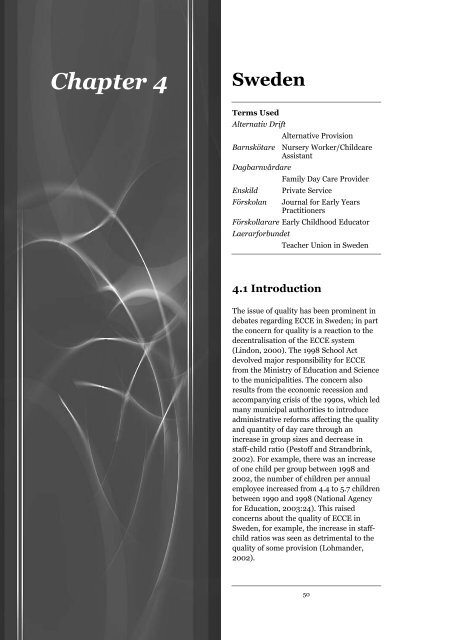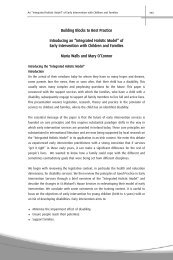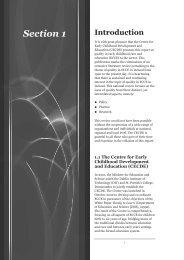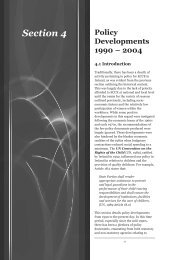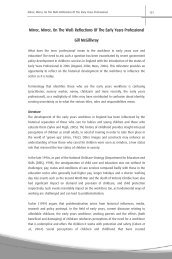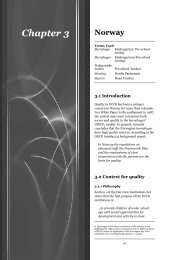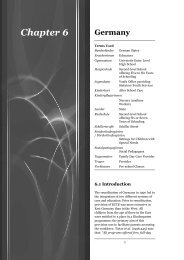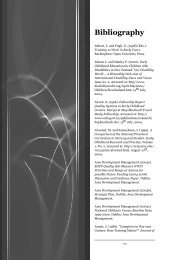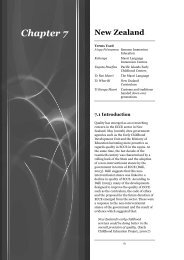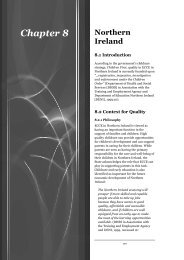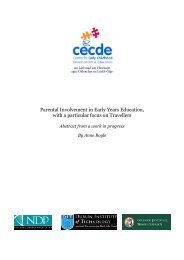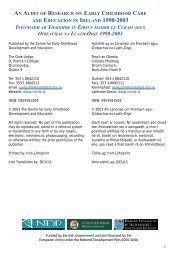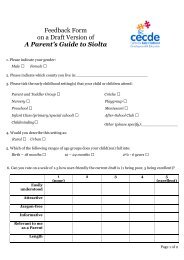Sweden - Centre for Early Childhood Development & Education
Sweden - Centre for Early Childhood Development & Education
Sweden - Centre for Early Childhood Development & Education
Create successful ePaper yourself
Turn your PDF publications into a flip-book with our unique Google optimized e-Paper software.
Chapter 4<strong>Sweden</strong>Terms UsedAlternativ DriftAlternative ProvisionBarnskötare Nursery Worker/ChildcareAssistantDagbarnvårdareFamily Day Care ProviderEnskild Private ServiceFörskolan Journal <strong>for</strong> <strong>Early</strong> YearsPractitionersFörskollarare <strong>Early</strong> <strong>Childhood</strong> EducatorLaerar<strong>for</strong>bundetTeacher Union in <strong>Sweden</strong>4.1 IntroductionThe issue of quality has been prominent indebates regarding ECCE in <strong>Sweden</strong>; in partthe concern <strong>for</strong> quality is a reaction to thedecentralisation of the ECCE system(Lindon, 2000). The 1998 School Actdevolved major responsibility <strong>for</strong> ECCEfrom the Ministry of <strong>Education</strong> and Scienceto the municipalities. The concern alsoresults from the economic recession andaccompanying crisis of the 1990s, which ledmany municipal authorities to introduceadministrative re<strong>for</strong>ms affecting the qualityand quantity of day care through anincrease in group sizes and decrease instaff-child ratio (Pestoff and Strandbrink,2002). For example, there was an increaseof one child per group between 1998 and2002, the number of children per annualemployee increased from 4.4 to 5.7 childrenbetween 1990 and 1998 (National Agency<strong>for</strong> <strong>Education</strong>, 2003:24). This raisedconcerns about the quality of ECCE in<strong>Sweden</strong>, <strong>for</strong> example, the increase in staffchildratios was seen as detrimental to thequality of some provision (Lohmander,2002).50
Chapter 4<strong>Sweden</strong>Most notable when looking at the issue ofquality in <strong>Sweden</strong> is the lack of centraliseddefinitions and the absence of mechanisms<strong>for</strong> monitoring quality at a national level.Responsibility <strong>for</strong> quality assurance lieswith the local authorities and individualsettings (Mooney et al., 2003). Thegovernment once regulated ECCE servicesin a strict manner in <strong>Sweden</strong> and raised thestandards and the expectations of serviceusers nationally. According to Mooney etal. (2003:12):Once services are generally of a highstandard and communities have cometo expect this level of service,governments appear more able todevolve responsibility <strong>for</strong> qualityassurance and have less need of acentralised approach.4.2 Context <strong>for</strong> Quality4.2.1 PhilosophyECCE in <strong>Sweden</strong> is linked to a societalvision <strong>for</strong> children in the future. Childcarein <strong>Sweden</strong> has two primary aims; tosupport and encourage children'sdevelopment and learning and to enableparents to combine their childcareresponsibilities with education oremployment (OECD, 2001). ECCE has hadhigh priority <strong>for</strong> several decades and is acentral component of family policy in<strong>Sweden</strong> (Kamerman, 2001). Lohmander(2002) describes childcare as a cornerstoneof the Swedish publicly funded socialwelfare system. There is a strong belief thatchildhood should be valued in and of itself(Mooney et al., 2003) and the provision ofhigh quality ECCE service is seen as animportant task <strong>for</strong> society (Lohmander,2002). Pre-school provision is alsoidentified as the first step in the life-longlearning process (Prieto et al., 2002) andthe need <strong>for</strong> a smooth transition from preschoolto school has been a concern ofpolicy makers in <strong>Sweden</strong> <strong>for</strong> many years. In<strong>Sweden</strong>, special emphasis is placed on well-educated staff, size and composition ofgroups and the suitability of the premisesand "…the declared goal is childcarewholly free of charge." (cited in Pestoff andStrandbrink, 2002:16)Mayall (1996:56) notes there has been achange in the conceptualisation of childrenin <strong>Sweden</strong> in recent years as a distinctsocial group, with a shared responsibility<strong>for</strong> them between parents and the State4.2.2 PolicyIn <strong>Sweden</strong>, the locus of policymakingregarding ECCE is both national and local(Kamerman, 2000). While overall nationalgoals and guidelines <strong>for</strong> ECCE are set atnational level (these goals are set out in the1998 School Act, the curriculum and otherordinances), the municipality decides howthe goals should be made concrete (OECD,1999a). The National Agency <strong>for</strong> <strong>Education</strong>monitors the fulfilment of these goals.Municipalities are charged with providingsufficient numbers of pre-school andleisure time places, with monitoring thequality of ECCE services and with providingsufficient resources. Following thedecentralisation of responsibility <strong>for</strong> ECCE,most local authorities establishedcommittees to deal with issues of relevanceto children and adolescents (Lindon,2000). Teachers, heads of ECCE centresand of out of school provision arerepresented on these committees.In 1996, responsibility <strong>for</strong> public childcarewas transferred from the Ministry of Healthand Social Affairs to the Ministry of<strong>Education</strong> and Science. This representsrecognition of the educational benefits ofECCE services and a desire to facilitate theintegration of the childcare and the <strong>for</strong>maleducation system (OECD, 1999b).4.2.3 FundingThe main source of subsidy <strong>for</strong> parentalchildcare costs is supply funding(Candappa et al., 2003) in the <strong>for</strong>m of51
Chapter 4<strong>Sweden</strong>vouchers. Since 1992, private <strong>for</strong>-profitcommercial firms were eligible to receivepublic funding <strong>for</strong> running day careservices (Pestoff and Strandbrink, 2002).In January 2002, a nation-wide fee ceilingknown as the "Max Tax" was introduced(Petrie et al., 2003), meaning that feescannot exceed a certain sum, which had theeffect of reducing the cost <strong>for</strong> many families(OECD, 1999b). Under the "Max Tax", theparental fee <strong>for</strong> one child attending a preschoolcentre is three percent of householdincome, be<strong>for</strong>e tax, up to a maximum ofSEK1,140 a month (€122 as of July 2002);<strong>for</strong> a second child parents pay two percentof household income and <strong>for</strong> a third childone percent. No fees are charged on fourthand subsequent children. According toPestoff and Strandbrink (2002:25), this hasstandardised the funding of childcareprovision through the voucher system <strong>for</strong>all children in <strong>Sweden</strong>The 1998 School Act requires localauthorities to provide childcare at a preschool,at a leisure time centre or in afamily day care home without undue delay(generally interpreted as within a threemonth period) to facilitate parents to workor study (Swedish Institute, 2001). FromJuly 2000, local authorities are required tooffer a pre-school place <strong>for</strong> at least threehours a day to children of unemployedparents. From January 2002, this alsoapplied to children from families where oneof the parents is at home on parental leavelooking after a brother or sister (SwedishInstitute, 2001). As of January 2003, allfour and five year olds are entitled to threefree hours of pre-school a day from theautumn term of the year they turn four.Provision of this is mandatory by localauthorities but children's attendance isvoluntary.Though compulsory schooling begins atseven, since 1998 municipalities have beenobliged to provide all six year olds with aplace in a pre-school class <strong>for</strong> at least 525hours per year. Though attendance at theseclasses is voluntary, virtually all six youolds attend. <strong>Sweden</strong> is moving to universalprovision; the government's long-term goalis the provision of free childcare facilities,which are available to all (Skolverket,2000).4.2.4 Delivery StrategyThe delivery strategy in terms of ECCE in<strong>Sweden</strong> is a supply strategy, as mostprovision is publicly funded and publiclydelivered. However non-municipalprovision of day care services (alternativdrift [alternative provision] or enskild[private] services) expanded following 1985(Pestoff and Strandbrink, 2002).In 1991, the conservative governmentintroduced the idea of freedom of choice;that pre-school provision would beprivately organised but publicly funded.This led to an increase in non-municipalday care services. Pestoff and Strandbrink(2002) note that the development of nonmunicipalday care services has proceededvery unevenly with privately owned servicesmore likely to develop in urban than ruraland sparsely populated areas.Non-municipal day care services includeparent co-ops, voluntary organizations,worker co-ops, organizations with specialpedagogies, and a combination of these orother <strong>for</strong>ms. In particular, parent co-opswitnessed an increase in the early 1990s, asthey were often the only chance <strong>for</strong> parentsto obtain a day care place. Parent co-opsare based on parental participation andinfluence, and parents have more roles thanin municipal day care services. In 1986,there were only eighteen parent co-ops inStockholm, but by 1990 it had grown to140, and by 1995 there are about 200parent co-ops (Pestoff and Strandbrink,2002).According to Pestoff and Strandbrink(2002), nearly two-thirds of the nonmunicipalday care facilities in 1995 wereeither provided by parent and worker52
Chapter 4<strong>Sweden</strong>cooperatives or voluntary organizations. Atthe beginning of 1995, about twenty percent of all day care was provided by privatefacilities in Stockholm, most of which werecooperative.4.3 Defining Quality4.3.1 RegulationWhen it comes to regulating quality inECCE in <strong>Sweden</strong>, there are no nationalstandards; rather standards are establishedby the municipalities. However, it shouldbe noted the devolution of responsibility <strong>for</strong>setting standards followed a period whereECCE was strictly regulated:…covering everything from types ofbuildings and child/staff ratio to thenumber of square meters per child,these regulations gradually loosenedup and became more flexible.(Lohmander, 2002:102)The School Act 1995 stipulates thatmunicipalities must provide pre-schoolactivities of high quality and outlinesquality indicators <strong>for</strong> ECCE services in<strong>Sweden</strong>:In the ECEC settings there should bestaff with the requisite education orexperience capable of satisfying thechild's need <strong>for</strong> high quality care andeducation. The size and compositionof the groups should be appropriate.The premises should be suitable <strong>for</strong>their purpose. Activities should bebased on the individual needs of thechild. Children who need specialsupport <strong>for</strong> their development shouldreceive care related to their needs.(OECD, 1999a:44)It is up to local authorities to decide theway in which these indicators areinterpreted and implemented. The privatenon-State sponsored sector is not regulatedin <strong>Sweden</strong> but this sector is quite small.4.3.2 CurriculumThe pre-school curriculum is identified asimportant in developing quality in thepedagogical work of the pre-school (OECD,1999a). The first national guidelines <strong>for</strong>pre-schools (<strong>Education</strong>al Programme <strong>for</strong>Pre-schools) were developed in <strong>Sweden</strong> in1988 (Alvestad and Samuelsson, 1999). In1998, a new curriculum, "Curriculum <strong>for</strong>Preschools," came into effect. While thiscurriculum only relates to publicly fundedpre-schools, it can be used as a guide byprivate pre-schools. The current pre-schoolcurriculum is linked to the curricula <strong>for</strong>first and second level education andencompasses shared views on knowledge,development and learning (OECD, 1999a),providing a single framework <strong>for</strong> children'seducational experience.The curriculum consists of two parts, "Preschools'Ground Values and Mission" and"Goals and Directions concerning theeducational work of preschools" (Alvestadand Samuelsson, 1999). Five groups ofGoals and Directions are specified,including norms and values, developmentand learning, children's influence, preschooland home and co-operating withschool (Alvestad and Samuelsson, 1999).The focus of the curriculum is ondemocratic principles, on the developmentof an ethical code of democracy on the partof the children, and to this end, activitiesshould be carried out in accordance withfundamental democratic values.Documentation of the work carried out isseen as important in in<strong>for</strong>ming thedevelopment and implementation of thecurriculum.The curriculum does not indicate themethods to be used to reach the specifiedgoals, and as such Alvestad andSamuelsson (1999) see it as more or aphilosophical framework, than a traditionalcurriculum. It is the role of themunicipalities to decide how the goals andguidelines will be implemented. Allcommunities have a sum of money to use toeducate pre-school staff on the goals of the53
Chapter 4<strong>Sweden</strong>new curriculum (Alvestad and Samuelsson,1999).4.3.3 Staff TrainingCameron et al. (2003) note that theeducational levels, training requirementsand working conditions of staff in <strong>Sweden</strong>are high. Förskollarare (early childhoodeducators) are employed by themunicipalities to work in publicly fundedchildcare facilities and are employed towork both in pre-schools and pre-schoolclasses. Förskollarare undergo three yearsof university training and about 60 per centof those employed in pre-schools have thislevel of training.Barnskötare (nursery worker or childcareassistant) complete three years of uppersecond level training. The OECD report(1999a) notes that it has been difficult <strong>for</strong>Barnskötare to find employment in recentyears as many municipalities try to increasequality by increasing the employment ofFörskollarare.Cameron et al. (2003) note that <strong>Sweden</strong> iscurrently integrating its occupationalmodels within the education system, basedaround the concept of a single worker (ateacher) qualified to work in pre-schools,schools and out-of-school services. Allteachers will undergo three and a half yearsof training at degree level, of which 18months will be common to all students andthe remainder is specialised according tothe intended type of teaching (pre-schoolteachers/pedagogues, free time teachersand teachers across the whole schoolrange). All staff will be known as teachers(Swedish Ministry of <strong>Education</strong> andScience, 2000). It is hoped that the:…provision of a common trainingframework should facilitate thebuilding of linkages across thedifferent phases of lifelong learning(OECD, 2001:99).Dagbarnvårdare (family day careproviders) are not required by the State toobtain any training, though it isrecommended that they complete a trainingcourse. Most municipalities have institutedspecial training of about 50-100 hours asan introduction <strong>for</strong> dagbarnvårdare. Aboutthree-quarters of those providing familyday care have either a childmindercertificate or have undergone 50-100 hoursof mandatory training from municipalemployers (Cameron et al., 2003).4.3.4 Professional <strong>Development</strong>It is the responsibility of the municipalitiesto provide in-service training <strong>for</strong> ECCEpractitioners. A variety of trainingopportunities are provided in conjunctionwith universities ranging from shortcourses to longer term courses covering avariety of subjects, including children withspecial needs, intercultural education andeducational administration (Oberhuemerand Ulich, 1997). Petrie et al. (2003:13)describe the in-service training <strong>for</strong> centrebased services in <strong>Sweden</strong> as "...welldeveloped." However in-service training isnot so developed <strong>for</strong> family day careproviders.The Lerum Competence <strong>Development</strong>Project began in 1994 and aimed to developa model <strong>for</strong> educator in-service training toimprove the quality of day care (Sheridan,1995). The training provided was based onfacilitating day care providers' awareness ofa range of issues and topics. The projectused a variety of methods to deliver thetraining including external lectures,literature studies, learning organisationsand self-evaluation. Teachers receivedtraining on their actual needs based onresults measured by the ECERS (Sheridan,1995).4.3.5 Public AwarenessIn <strong>Sweden</strong>, parents recognise and expectprovision of a high quality (Mooney et al.,54
Chapter 4<strong>Sweden</strong>2003) and parental and societalexpectations are an important componentof quality assurance (Alcock, 1996). Oneexample of this is in the small rural town ofTrelleborg where parents demonstratedpublicly and successfully when the localmunicipality was considering increasinggroup sizes to twenty. The general concernabout the reduction in municipal spendingin ECCE, and its effects on structuralfeatures of quality such as group size andstaff ratios, also reflect a high level ofawareness and concern about the issue ofquality at a societal level.4.4 Measuring QualityMunicipalities are responsible <strong>for</strong>monitoring the quality of ECCE, and as aresult, monitoring varies betweenmunicipalities (OECD, 1999c). In recentyears, traditional inspectors have beenreplaced with advisers who are viewed ashaving a support and development role(Mooney et al., 2003). The <strong>Education</strong>alInspectorate of the National Agency <strong>for</strong><strong>Education</strong> inspects at local authority levelto ensure that all children have access to ahigh standard of childcare.4.5 Supporting Quality4.5.1 Pedagogical DocumentationPedagogical documentation is a mechanismof quality assurance that is prominent in<strong>Sweden</strong> (Alcock, 1996). Pedagogicaldocumentation is about making practicevisible. Documentation is seen as theprinciple mechanism <strong>for</strong> articulating thecurriculum. Pedagogical documentation isinclusive of multiple perspectives on qualityas it integrates different perspectives onquality. As well as observations, thedocumentation seems to include a broaderconcept of data gathering, includingchildren's explanations and descriptions ofexperiences/works (Alcock, 1996). Themework was prevalent and documented toenable the theme to be explored at a deeplevel over an extended period of time.Themes may be a way of includingconceptual content, knowledge and skillsinto a possibly empty developmentallyappropriate curriculum. Theme work isexplicitly promoted in the Swedish andNorwegian early childhood curriculumframeworks.4.5.2 NetworksAccording to Alcock (1996), organisednetworks of early childhood educators orcentres are viewed as a quality system in<strong>Sweden</strong>, as they promote the exchange ofideas and facilitate ongoing professionaldevelopment amongst ECCE professionals.One important network centres on theReggio Emilia Institute based in the teachertraining college in Stockholm. The ReggioEmilia Institute promotes networksthroughout <strong>Sweden</strong> at local, national andinternational levels (Alcock 1996). Theteachers' union (Laerar<strong>for</strong>bundet) plays astrong role in providing ongoingprofessional development amongst ECCEprofessionals through networks andseminars.Stockholm municipality uses a network<strong>for</strong>mat to provide professional developmentcourses <strong>for</strong> early childhood educators.ECCE practitioners meet together regularlyover a nine month period <strong>for</strong> lectures,discussion and reflection around suchtopics as pedagogical leadership andreflective discourse (Alcock, 1996). Ajournal produced <strong>for</strong> ECCE practitioners(Förskolan) has a circulation of 50,000 perissue (Oberhuemer and Ulich, 1997).4.5.3 ResearchCameron et al. (2003) note that since the1960s, <strong>Sweden</strong> has collected statisticsannually on dimensions of quality such as55
Chapter 4<strong>Sweden</strong>group size, ratios and staff education,which are used to monitor and evaluate theeffects of policy decisions. The NationalAgency <strong>for</strong> <strong>Education</strong> is responsible <strong>for</strong>these official statistics which givemunicipalities a basis <strong>for</strong> monitoringdevelopments including changes in quality.Other surveys are carried out periodically,such as surveys focused on access tochildcare <strong>for</strong> children with unemployedparents, productivity and quality inchildcare, analysis of factors influencingparents of small children and children inneed of special support in childcare. Thesesurveys provide in<strong>for</strong>mation about thedifferent municipalities in <strong>Sweden</strong> (OECD,1999a).In recent years, research has turned itsfocus on quality as evidenced by theconcern with the development of newprogrammes such as new parent-staffcommunication programmes, educationalprogrammes, organisational developmentprogrammes and with the evaluations ofthese programmes (OECD, 1999a). Otherimportant areas of programmedevelopment that have received fundinginclude age-flexible entry dates intoschools, pre-schools <strong>for</strong> all children,pedagogical methods <strong>for</strong> working with theyoungest children, group orientated workmethods in ECCE groups with a largenumber of children, programmes linked toenvironmental protection and conservationand male personnel in ECCE settings(OECD, 1999a).Municipalities working together innetworks on the same programmedevelopment area can avail of specialfunding to complete this work. Oneexample is immigrant children in childcare(OECD, 1999a). The network uses seminarsand other <strong>for</strong>a to disseminate in<strong>for</strong>mation.The National Agency <strong>for</strong> <strong>Education</strong> is alsoinvolved in several pieces of research, <strong>for</strong>example, a <strong>for</strong>ecast of future recruitmentneeds in the pre-school sector and leisuretime pedagogues, studies aimed atmonitoring the integration of the preschoolclass and the school and work onidentifying and establishing qualityindicators in ECCE:Documentation of pedagogicalactivities as a basis <strong>for</strong> evaluationand quality improvements is beingstudied in a different project. Tied tothis project is the production of studymaterials to assist in implementingpedagogical documentation as aworking method in ECEC-settings.(OECD, 1999a:64)The National Agency <strong>for</strong> <strong>Education</strong> has alsocommissioned research reviews ofchildren's learning from the early yearsonwards.Prieto et al. (2002) conducted a study ofparent's choice of pre-school care facilitywhich focused on whether or not pre-schoolinstitutions could be seen as meeting needs.A survey was carried out among 1,584mothers of children born in 1995, whichexamined parents' choice of pre-school carefacility in the city of Uppsala. The studyfound that parents' use of the right tochoose between pre-school facilities waseconomically, socially and culturallysegregated. Furthermore the authorssuggest that the choice of pre-school facilityin Uppsala leads to the creation of sociallyand culturally homogenous private preschoolfacilities, which makes it impossible<strong>for</strong> them to achieve the goal of beingmeeting places.4.6 <strong>Education</strong>alDisadvantage and SpecialNeedsSince the 1960's, <strong>Sweden</strong> has tried tomove away from a simpleclassification of "children at risk" and"children with special needs" relatedto a deficit concept and the role of56
Chapter 4<strong>Sweden</strong>institutions being to make good thatdeficit. (Dahlberg et al., 1999:124)Municipalities have responsibility <strong>for</strong>children in need of special support andmust offer a place in an ECCE setting to allthese children, whether their parents workor not. Children with additional needs areentitled to a three-hour session in a preschool,free of charge, throughout thewhole of their childhood (OECD, 1999a).The group of children needing specialsupport is not clearly defined, <strong>for</strong> example,it can include disabled children, childrenwith difficulty concentrating or childrenwith psychosocial troubles (OECD, 1999a).One of the principles <strong>for</strong> those needingspecial supports is that their needs areprimarily to be met in regular childcare andnot by singling them out <strong>for</strong> specialtreatment (Swedish Institute, 2001).Integration is the basis <strong>for</strong> special supportand involves the careful planning of dailyactivities (OECD, 1999a). Otheradjustments that can be made to thechildcare environment include theprovision of additional support personnelor a lower adult-child ratio. More than 90per cent of municipalities have fundsearmarked <strong>for</strong> children in need of specialsupport. Most municipalities have routines<strong>for</strong> placement, follow-up and action plans<strong>for</strong> pre-school children in need of specialsupport. However, half have specific goalled documents and these are often notlinked to specific funding or resources.Many children in <strong>Sweden</strong> have roots inother cultures and these children are oftenin need of special support. One of thespecific objectives of childcare in <strong>Sweden</strong> isthe support of children's dual culturalaffiliations and their chances of activelydeveloping bilingual skills (SwedishInstitute, 2001). The government has madefunds available to provide children frombilingual backgrounds with a free threehoursession of day-care on a daily basisfrom the age of three. Special mothertongue teaching tuition is provided tochildren whose first language is notSwedish (Swedish Institute, 2001).4.7 Implications <strong>for</strong>Ireland4.7.1 RegulationsThere is a lack of centralised definitions ofquality in <strong>Sweden</strong> and an absence ofmonitoring mechanisms at a national level;rather responsibility <strong>for</strong> quality assurancelies with local authorities and individualsettings. This follows a period in whichquality was strictly monitored andcontrolled.4.7.2 CurriculumThe pre-school curriculum is identified asimportant in developing quality in thepedagogical work of the pre-school. In<strong>Sweden</strong>, a new curriculum <strong>for</strong> pre-schoolssets out the goals and directions of theeducational work of pre-schools andemphasises the development of an ethicalcode of democracy on the part of children.However, the curriculum does not indicatethe methods that are to be used to reachthese goals. Documentation <strong>for</strong> the workcarried out in pre-schools is identified asimportant in in<strong>for</strong>ming the developmentand implementation of the curriculum. It isbroad in design and it is the role of themunicipalities to decide how the goals andguidelines will be implemented.4.7.3 Care and <strong>Education</strong>One trend clearly visible in terms of ECCEis the development of a unified system ofcare and education <strong>for</strong> all children. In<strong>Sweden</strong>, responsibility <strong>for</strong> public childcarewas transferred to the Ministry <strong>for</strong><strong>Education</strong> and Science in 1996. The newlydeveloped curriculum <strong>for</strong> pre-schooleducation is linked to the curricula <strong>for</strong> firstand second level education, thus ensuringthat there is a single framework <strong>for</strong> a child'seducational experience in <strong>Sweden</strong>. <strong>Sweden</strong>is also currently integrating its occupationalmodels within the education system, basedaround the concept of a single worker (ateacher) qualified to work in pre-schools,57
Chapter 4<strong>Sweden</strong>schools, and out-of-school services.4.7.4 StaffingThe availability of well-trainedpractitioners is seen as important in theprovision of high quality care andeducation in <strong>Sweden</strong>. Three years ofuniversity training is the standard <strong>for</strong> thoseworking in the ECCE sector. Whereaspreviously, assistants with three years ofupper second level training were employedin ECCE institutions, those with thiseducational qualification have experienceddifficulty in gaining employment over thepast few years.4.7.5 Professional <strong>Development</strong>Professional development is also identifiedas very important and the municipalitiesare responsible <strong>for</strong> the provision of trainingto ECCE practitioners. A range of trainingopportunities is provided in conjunctionwith the universities. For example, allmunicipalities have been provided withfunds to provide training to pre-school staffon the goals of the new curriculum.4.7.6 InspectionWhile the municipalities are responsible <strong>for</strong>monitoring the quality of ECCE, traditionalinspectors are now viewed as having asupport and development role in terms ofpromoting and supporting quality.4.7.8 Parental InvolvementIn <strong>Sweden</strong>, parents recognise and expectprovision of a high quality, and parentaland societal expectations are an importantcomponent of quality assurance. This hasbeen seen in recent years in the publicconcern about the trends regardingincreasing group size and staff child ratiosin ECCE institutions. In some areas of<strong>Sweden</strong>, parents have demonstratedpublicly and successfully against anincrease in group size.4.7.9 ResearchDifferent conceptualisations of highstandards have been explored in <strong>Sweden</strong>and in particular the project <strong>Early</strong><strong>Childhood</strong> Pedagogy in a Changing Worldlooks at the development of high standardsin ECCE institutions from a post-modernperspective.4.7.10 Data Collection<strong>Sweden</strong> has collected statistics annually ondimensions of quality such as group size,ratios and staff education. These statisticsare used to monitor and evaluate the effectsof policy decisions and give municipalities abasis <strong>for</strong> monitoring changes in pre-schoolprovision. Some research has focused onnew programmes introduced such as a newparent/staff communication programme,new educational programmes andorganisational development programmes.4.7.7 NetworksOrganised networks of early childhoodeducators or centres have the potential tosupport the development of quality, as theyfacilitate both the exchange of ideas andongoing professional development. Thedevelopment of networks of practitioners isfacilitated and encouraged in <strong>Sweden</strong> andthese networks are used to provideprofessional development courses <strong>for</strong> ECCEpractitioners and to disseminate learningfrom pilot projects.4.7.11 Special NeedsMunicipalities are required to offer a placein an ECCE institution to all children withspecial needs. Integration is the basis <strong>for</strong>the provision of support <strong>for</strong> children withspecial needs and this involves the carefulplanning of daily activities and theadjustments to the ECCE environment.Children from a non-Swedish culturalbackground also receive additionalsupports.58
Chapter 4<strong>Sweden</strong>4.7.12 Pedagogical DocumentationPedagogical documentation is a mechanismof quality assurance and is pervasive inpractice in ECCE institutions. It is anapproach that is inclusive of multipleperspectives on quality as it integratesdifferent perspectives on quality.The collection of statistics on a range ofstructural features of quality in <strong>Sweden</strong>is an integral part of central governmentpolicy regarding ECCE and provides abasis <strong>for</strong> policy decisions.An integrated approach is adopted <strong>for</strong>children with special needs.4.7.13 ConclusionIn conclusion, on the strength of theevidence collected from <strong>Sweden</strong>, a numberof features of quality can be identifiedwhich are worth considering in thedevelopment of the National Framework<strong>for</strong> Quality in Ireland:A unified system of care and educationis an important feature of ECCE in<strong>Sweden</strong>.There is a single framework <strong>for</strong> a child'seducational experience at pre-primary,first and second level education.There is no single definition of qualityand considerable discretion is given tolocal municipalities regarding aspects ofquality. The curriculum provides aunifying framework <strong>for</strong> quality in ECCEservices. Highly qualified practitionerssupport this curriculum with access toprofessional development opportunities.While municipalities are responsible <strong>for</strong>the monitoring of ECCE, inspectors arenow viewed as having a support anddevelopment role in promoting,supporting and developing quality.One unique feature of the ECCE sectorin <strong>Sweden</strong> is the use of networks tosupport quality in the ECCE sector.Other mechanisms <strong>for</strong> supportingquality include the widespread use ofpedagogical documentation and ageneral awareness and concern at asocietal level regarding some of theaspects of high quality childcare.59


